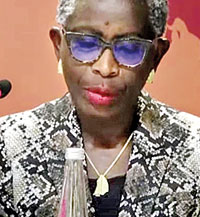News
IMF finds weak leadership a factor in not achieving macroeconomic goals
View(s):By Kapila Bandara
A high-ranking IMF official suggested Friday, the responsibility for achieving macroeconomic stability and driving structural reforms, in countries facing daunting economic challenges, lies in the hands of their leaders.
The IMF’s Deputy Managing Director, Antoinette Sayeh, said there is not much the IMF can do about weak leadership. Ms. Sayeh, a former minister of finance in post-conflict Liberia, graduated with a bachelor’s degree with honors in economics from Swarthmore College and a PhD in International Economic Relations from the Fletcher School at Tufts University.
She was speaking at a high-level policy panel discussion in Delhi where Shamsul Alam, minister of state, Bangladesh Planning Commission, Ministry of Planning; Maha Prasad Adhikari, the governor of the Nepal Rastra Bank; Nandalal Weerasinghe, the governor, Central Bank of Sri Lanka; as well as V. Anantha Nageswaran, chief economic advisor of India, participated.

Antoinette Sayeh
Often the IMF is targeted for criticism by incompetent, corrupt, national leaders, lawmakers and central bankers for the fund’s macroeconomic and structural policy packages, but the reality is that it is the countries in distress that do not have the fiscal and monetary discipline to right their sinking ships.
Ms Sayeh said there is no question that strong institutions play “a hugely important role in mitigating the impact of tendencies towards reform and to change direction that are very harmful to countries. “But, I would say that in addition to strong institutions, strong leadership is another piece.’’
She said: “On the latter, there is not a lot that the fund (IMF) can contribute, but on the building of institutions, certainly we have a very important role in the form of our policy advice, but also more importantly perhaps, in the form of capacity development support we provide to countries to help them build strong institutions. But, our finding is that the actual result of having strong institutions, as a result of providing technical assistance and training, has a lot to do with strong leadership, making sure that when people are trained to manage their debt properly that they have to a voice in decisions around what debt to contract, or not. And we have experiences where the fund has invested significantly in helping to train officials, who have been ignored when it comes to things that they know about than those who are making those decisions.
“So, these are aspects of weak institutions as well, but also weak leadership, I think. And there’s not much the fund has to do about that… the issue of weak leadership.’’
On various occasions, the IMF has provided technical assistance to Sri Lanka, including the Forecasting and PolicyAnalysis System for the Central Bank of Sri Lanka to build up its technical capacity in its transition to the flexible inflation targeting framework.
Sri Lanka has sought IMF assistance on 16 occasions since 1965 and has reaped the rewards only a few times. Successive governments have abandoned macroeconomic adjustments and structural reforms, soon after collecting some disbursements. In 2016, June, Sri Lanka sought an Extended Fund Facility of US$1.07bn SDRs and drew down US$952.23m. The fiscal targets were not met.
At the Delhi discussion, Ms Sayeh said that despite weak leadership, the fund, “can help civil society ask harder questions of their leaderships, and we can do that in sharing more information and being more transparent about putting out data about how they are managing their budgets, educating parliamentarians about some of the cost of policy choices and our analytic work and our policy advice can be very powerful in those circumstances’’.
“I know from my own experiences, that they can strongly support reformers in wanting to turn things around. So, it has to be a combination of the country’s own decision, to take things forward, enabled by a more educated public that ask harder questions, as well as focused capacity development support from institutions like ourselves, which can help countries towards that objective.’’
She made the observation after CBSL’s Dr Weerasinghe commented about the value of strong, independent institutions in response to a question by Krishna Srinivasan, the director of the IMF’s Asia and Pacific Department, about challenges to the policy framework and institutions in anchoring strong, inclusive growth.
Dr Weerasinghe said that, “the lack of strong institutions and some of the missteps, basically turned around decades of good work and moved the country back several decades’’.
“In terms of macro policies, one key one is the fiscal imbalances that have been growing several decades….We have gone to the IMF 16 times. This is the 17th time. If you look back at the earlier IMF programmes, last 10 programmes, and look at the objectives, same objectives, revenue-based fiscal consolidation, high debt and balance of payment issues. So, we have been going back and forth,’’ he said. “Always in the programme, we go two steps forward and take again one step backwards, so that’s no progress.. it’s mainly because of this important topic, the strong fiscal rules, independent central bank, independent regulatory institutions, independent public service, politicising all Government operations, these are the reasons.’’
The best way to say that you found the home of your dreams is by finding it on Hitad.lk. We have listings for apartments for sale or rent in Sri Lanka, no matter what locale you're looking for! Whether you live in Colombo, Galle, Kandy, Matara, Jaffna and more - we've got them all!

